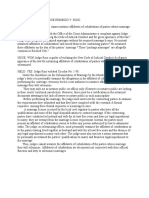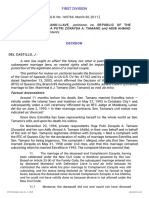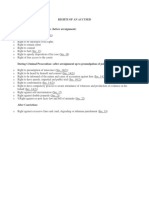100%(4)100% found this document useful (4 votes)
800 viewsLlave Vs Republic GR 169766
Llave Vs Republic GR 169766
Uploaded by
Levi Isalos1) Sen. Tamano was previously married to Haja Putri Zorayda A. Tamano in 1958 under both civil and Muslim rites. Around 11 months before his death, he married Estrellita Juliano-Llaver under Islamic laws and a civil ceremony, where his civil status was indicated as divorced.
2) Zorayda and her son filed a case to nullify the marriage between Estrellita and Sen. Tamano, claiming it was bigamous since divorce is not allowed under the New Civil Code.
3) The Supreme Court upheld the lower courts' rulings, denying Estrellita's petition. It held that Sen. Tamano's previous marriage to Z
Copyright:
© All Rights Reserved
Available Formats
Download as DOC, PDF, TXT or read online from Scribd
Llave Vs Republic GR 169766
Llave Vs Republic GR 169766
Uploaded by
Levi Isalos100%(4)100% found this document useful (4 votes)
800 views2 pages1) Sen. Tamano was previously married to Haja Putri Zorayda A. Tamano in 1958 under both civil and Muslim rites. Around 11 months before his death, he married Estrellita Juliano-Llaver under Islamic laws and a civil ceremony, where his civil status was indicated as divorced.
2) Zorayda and her son filed a case to nullify the marriage between Estrellita and Sen. Tamano, claiming it was bigamous since divorce is not allowed under the New Civil Code.
3) The Supreme Court upheld the lower courts' rulings, denying Estrellita's petition. It held that Sen. Tamano's previous marriage to Z
Original Description:
hjhj
Original Title
Llave vs Republic GR 169766
Copyright
© © All Rights Reserved
Available Formats
DOC, PDF, TXT or read online from Scribd
Share this document
Did you find this document useful?
Is this content inappropriate?
1) Sen. Tamano was previously married to Haja Putri Zorayda A. Tamano in 1958 under both civil and Muslim rites. Around 11 months before his death, he married Estrellita Juliano-Llaver under Islamic laws and a civil ceremony, where his civil status was indicated as divorced.
2) Zorayda and her son filed a case to nullify the marriage between Estrellita and Sen. Tamano, claiming it was bigamous since divorce is not allowed under the New Civil Code.
3) The Supreme Court upheld the lower courts' rulings, denying Estrellita's petition. It held that Sen. Tamano's previous marriage to Z
Copyright:
© All Rights Reserved
Available Formats
Download as DOC, PDF, TXT or read online from Scribd
Download as doc, pdf, or txt
100%(4)100% found this document useful (4 votes)
800 views2 pagesLlave Vs Republic GR 169766
Llave Vs Republic GR 169766
Uploaded by
Levi Isalos1) Sen. Tamano was previously married to Haja Putri Zorayda A. Tamano in 1958 under both civil and Muslim rites. Around 11 months before his death, he married Estrellita Juliano-Llaver under Islamic laws and a civil ceremony, where his civil status was indicated as divorced.
2) Zorayda and her son filed a case to nullify the marriage between Estrellita and Sen. Tamano, claiming it was bigamous since divorce is not allowed under the New Civil Code.
3) The Supreme Court upheld the lower courts' rulings, denying Estrellita's petition. It held that Sen. Tamano's previous marriage to Z
Copyright:
© All Rights Reserved
Available Formats
Download as DOC, PDF, TXT or read online from Scribd
Download as doc, pdf, or txt
You are on page 1of 2
G.R. No.
169766: March 30, 2011
ESTRELLITA JULIANO-LLAVE,Petitioner,v. REPUBLIC OF THE PHILIPPINES,
HAJA PUTRI ZORAYDA A. TAMANO and ADIB AHMAD A. TAMANO, Respondents.
FACTS:
Around 11 months before his death, Sen. Tamano married Estrellita twice initially under the
Islamic laws and tradition and under a civil ceremony officiated by an RTC Judge at Malabang,
Lanao del Sur.In their marriage contracts, Sen. Tamanos civil status was indicated as divorced.
Private respondents Haja Putri Zorayda A. Tamano (Zorayda) and her son Adib Ahmad A.
Tamano (Adib filed a complaint with the RTC of Quezon City for the declaration of nullity of
marriage between Estrellita and Sen. Tamano for being bigamous.
It was further alleged that since Zorayda and deceased were married when the NCC was already
in effect, the subsequent marriage to Estrellita is void ab initio since divorce is not allowed under
the NCC. Moreover, the deceased did not and could not have divorced Complainant Zorayda by
invoking the provision of P.D. 1083, otherwise known as the Code of Muslim Personal Laws, for
the simple reason that the marriage of the deceased with Complainant Zorayda was never
deemed, legally and factually, to have been one contracted under Muslim law.
Instead of filing an Answer, Estrellita filed a motion to dismiss. The trial court denied Estrellitas
motion and asserted its jurisdiction over the case for declaration of nullity. Thus, Estrellita filed
acertioraripetition before the SC questioning the denial of her Motion to Dismiss which was
referred to and subsequently denied by the CA. This prompted Estrellita to file a petition for
review on certiorari before the SC (GR No. 126603)
Subsequent to the promulgation of the CA Decision, the RTC ordered Estrellita to present her
evidence but she asked for postponement. Unhappy with the delays in the resolution of their
case, Zorayda and Adib moved to submit the case for decision, reasoning that Estrellita had long
been delaying the case. Estrellita opposed, on the ground that she has not yet filed her answer as
she still awaits the outcome of G.R. No. 126603.
The RTC rendered the aforementioned judgment declaring Estrellitas marriage with Sen. Tamano
as void ab initio. On appeal to the CA, Estrellita argued that she was denied due process as the
RTC rendered its judgment even without waiting for the finality of the Decision of the Supreme
Court in G.R. No. 126603. The CA denied the appeal as she was given ample opportunity to be
heard but simply ignored it by asking for numerous postponements. Hence, this petition.
ISSUE: Whether or not the marriage of Estrellita and Tamano was bigamous
HELD:
The marriage between the late Sen. Tamano and Zorayda was celebrated in 1958, solemnized
under civil and Muslim rites. The only law in force governing marriage relationships between
Muslims and non-Muslims alike was the Civil Code of 1950, under the provisions of which only
one marriage can exist at any given time.Under the marriage provisions of the Civil Code,
divorce is not recognized except during the effectivity of Republic Act No. 394which was not
availed of during its effectivity.
As far as Estrellita is concerned, Sen. Tamanos prior marriage to Zorayda has been severed by
way of divorce under PD 1083,the law that codified Muslim personal laws. However, PD 1083
cannot benefit Estrellita. Firstly, Article 13(1) thereof provides that the law applies to "marriage
and divorce wherein both parties are Muslims, or wherein only the male party is a Muslim and
the marriage is solemnized in accordance with Muslim law or this Code in any part of the
Philippines." But we already ruled in G.R. No. 126603 that "Article 13 of PD 1083 does not
provide for a situation where the parties were married both in civil and Muslim rites."
Moreover, the Muslim Code took effect only on February 4, 1977, and this law cannot
retroactively override the Civil Code which already bestowed certain rights on the marriage of
Sen. Tamano and Zorayda.
DENIED.
You might also like
- Going HomeDocument5 pagesGoing Homeowejackie7000No ratings yet
- Ue College of Law Atty. David Robert C. Aquino: Statutory ConstructionDocument1 pageUe College of Law Atty. David Robert C. Aquino: Statutory ConstructionLevi IsalosNo ratings yet
- Leus v. St. Scholastica's College Westgrove (Digest)Document3 pagesLeus v. St. Scholastica's College Westgrove (Digest)ArahbellsNo ratings yet
- 25 Llave Vs RepublicDocument3 pages25 Llave Vs RepublicLara YuloNo ratings yet
- Llave Vs RepublicDocument1 pageLlave Vs RepublicJohn Michael Babas100% (1)
- Juliano-Llave V RepublicDocument2 pagesJuliano-Llave V RepublicWilliam Jenkins100% (5)
- DigestDocument12 pagesDigestCharles AtienzaNo ratings yet
- TUPAL Vs JUDGE REMEGIO ROJODocument1 pageTUPAL Vs JUDGE REMEGIO ROJOMariam PetillaNo ratings yet
- Tonog Vs CADocument2 pagesTonog Vs CAAllen So100% (1)
- Madridejo v. de Leon, GR. 32473, October 6, 1930Document1 pageMadridejo v. de Leon, GR. 32473, October 6, 1930MonicaCelineCaro100% (1)
- Case Brief - RP V IyoyDocument1 pageCase Brief - RP V IyoyRichel DeanNo ratings yet
- 50.1 de CAstro vs. Assidao-De Castro DigestDocument2 pages50.1 de CAstro vs. Assidao-De Castro DigestEstel Tabumfama100% (3)
- Valdez Vs RepublicDocument1 pageValdez Vs RepublicBernard AndomangNo ratings yet
- Del Socorro Vs Van WilsemDocument3 pagesDel Socorro Vs Van WilsemfledpengelNo ratings yet
- 255a. Beckett v. Sarmiento DigestDocument2 pages255a. Beckett v. Sarmiento DigestErla ElauriaNo ratings yet
- Alcantara V Alcantara GR No. 167746 (DIGEST)Document2 pagesAlcantara V Alcantara GR No. 167746 (DIGEST)Kresha Parreñas80% (5)
- Eliscupidez v. EliscupidezDocument2 pagesEliscupidez v. EliscupidezRamos Claude VinzonNo ratings yet
- Morigo v. PeopleDocument5 pagesMorigo v. PeoplePrinsesaJuuNo ratings yet
- Mendoza V RepublicDocument1 pageMendoza V RepublicRR FNo ratings yet
- REPUBLIC Vs LUDYSON C. CATUBAGDocument2 pagesREPUBLIC Vs LUDYSON C. CATUBAGLara Cacal100% (3)
- Valdez Vs RTCDocument1 pageValdez Vs RTCKernell Sonny Salazar100% (1)
- Republic of The Philippines vs. Merlinda L. Olaybar - G.R. No. 189538 - February 10, 2014Document2 pagesRepublic of The Philippines vs. Merlinda L. Olaybar - G.R. No. 189538 - February 10, 2014Kaye Mendoza100% (1)
- Matute V Macadaeg (1956)Document2 pagesMatute V Macadaeg (1956)Juan Angel EvangelistaNo ratings yet
- Go-Bangayan v. BangayanDocument3 pagesGo-Bangayan v. BangayanSand Fajutag100% (1)
- 01 Republic Vs IyoyDocument2 pages01 Republic Vs IyoyGeopano Luigi JrNo ratings yet
- ARUEGO Vs CA Case DigestDocument2 pagesARUEGO Vs CA Case DigestKim Lorenzo CalatravaNo ratings yet
- G.R. No. 164201 Pana Vs JuaniteDocument1 pageG.R. No. 164201 Pana Vs JuaniteJanine LlanaNo ratings yet
- Republic Vs Villanueva (2015) GR 210929Document2 pagesRepublic Vs Villanueva (2015) GR 210929RR FNo ratings yet
- Ty Vs CaDocument2 pagesTy Vs Catroy roqueNo ratings yet
- G.R. No. 206761 - Ambrose v. Suque-AmbroseDocument8 pagesG.R. No. 206761 - Ambrose v. Suque-AmbroseEtienneNo ratings yet
- Ninal Vs Bayadog DIGESTDocument2 pagesNinal Vs Bayadog DIGESTEarleen Del Rosario100% (5)
- Selanova Vs MendozaDocument2 pagesSelanova Vs MendozaOmpongGalapong100% (2)
- Beso v. DagumanDocument3 pagesBeso v. DagumanMarie TitularNo ratings yet
- Elisea Laperal Vs Republic of The PhilippinesDocument1 pageElisea Laperal Vs Republic of The Philippinesalexis_bea100% (1)
- Medina vs. KoikeDocument1 pageMedina vs. KoikeJILLIAN SABADONo ratings yet
- Abbas vs. Abbas - GR No 183896 (BETOYA, Shinar Ley)Document2 pagesAbbas vs. Abbas - GR No 183896 (BETOYA, Shinar Ley)Julius Manalo100% (2)
- Tongol Vs TongolDocument9 pagesTongol Vs TongollawsimNo ratings yet
- Bier Vs BierDocument1 pageBier Vs BierwesleybooksNo ratings yet
- PATRICIO vs. DARIO IIIDocument1 pagePATRICIO vs. DARIO IIIEricha Joy GonadanNo ratings yet
- Unson Vs NavarroDocument2 pagesUnson Vs NavarroAllen So100% (1)
- Alcazar Vs AlcazarDocument2 pagesAlcazar Vs AlcazarJc IsidroNo ratings yet
- De La Viña V VillarealDocument1 pageDe La Viña V VillarealEumell Alexis PaleNo ratings yet
- Catalan Vs Basa GR 159567Document2 pagesCatalan Vs Basa GR 159567JC Hilario100% (1)
- Republic vs. CantorDocument2 pagesRepublic vs. CantorKelsey Olivar Mendoza100% (2)
- Buenaventura V CA DigestDocument1 pageBuenaventura V CA Digestmybernal18No ratings yet
- Manuel Almelor Vs Las Piñas RTCDocument2 pagesManuel Almelor Vs Las Piñas RTCJiHahn PierceNo ratings yet
- Persons Article 6 To 17 Case BriefsDocument23 pagesPersons Article 6 To 17 Case BriefsBrian Balio100% (1)
- Geronimo vs. CA & EsmanDocument2 pagesGeronimo vs. CA & EsmanANTHONY SALVADICONo ratings yet
- San Luis Versus San Luis GR 133743Document4 pagesSan Luis Versus San Luis GR 133743Lu Cas100% (2)
- Quimiging V Icao Case DigestDocument2 pagesQuimiging V Icao Case DigestTrisha RamentoNo ratings yet
- Landicho Vs Relova Case DigestDocument3 pagesLandicho Vs Relova Case DigestWilfredNo ratings yet
- Almacen V BaltazarDocument1 pageAlmacen V BaltazarGeenea VidalNo ratings yet
- Baksh v. CADocument1 pageBaksh v. CAFayme Gabrielle GapayaoNo ratings yet
- Trinidad Vs CADocument2 pagesTrinidad Vs CAJuvy DimaanoNo ratings yet
- Void Marriages: Topic Author Case Title GR No Tickler Date DoctrineDocument2 pagesVoid Marriages: Topic Author Case Title GR No Tickler Date DoctrineSKSKSKSNo ratings yet
- Jones v. Hortiguela (1937)Document2 pagesJones v. Hortiguela (1937)Andre Philippe Ramos100% (1)
- DE CASTRO Vs ASSIDAO-DE CASTRODocument2 pagesDE CASTRO Vs ASSIDAO-DE CASTROMariam PetillaNo ratings yet
- Fujiki Vs Marinay (Digest)Document2 pagesFujiki Vs Marinay (Digest)abbyNo ratings yet
- Republic of The Philippines V. Liberato P. Mola Cruz G.R. No. 236629, July 23, 2018 DoctrineDocument3 pagesRepublic of The Philippines V. Liberato P. Mola Cruz G.R. No. 236629, July 23, 2018 DoctrineMona Lie100% (1)
- Gonzalez v. GonzalezDocument2 pagesGonzalez v. GonzalezGRNo ratings yet
- Republic of The Philippines vs. Maria Fe Espinosa Cantor - G.R. No. 184621 - December 10, 2013Document3 pagesRepublic of The Philippines vs. Maria Fe Espinosa Cantor - G.R. No. 184621 - December 10, 2013Kaye MendozaNo ratings yet
- LLave Vs RepublicDocument8 pagesLLave Vs RepublicKing BautistaNo ratings yet
- Llave v. RepublicDocument12 pagesLlave v. RepublicZoe Kristeun GutierrezNo ratings yet
- Rights of An AccusedDocument18 pagesRights of An AccusedLevi IsalosNo ratings yet
- First United: People'S SonaDocument4 pagesFirst United: People'S SonaLevi IsalosNo ratings yet
- Showcase Retrospective Metrics - A. Throughput B. Cycle Time - Adaptation / Practicing Stage E/ C. AnalysisDocument1 pageShowcase Retrospective Metrics - A. Throughput B. Cycle Time - Adaptation / Practicing Stage E/ C. AnalysisLevi IsalosNo ratings yet
- Puno vs. Puno Enterprises G.R. No. 177066 (September 11, 2009)Document13 pagesPuno vs. Puno Enterprises G.R. No. 177066 (September 11, 2009)Levi IsalosNo ratings yet
- S197313 149 Badges in 9 Different Badges 182 HW People Skills and DevtDocument1 pageS197313 149 Badges in 9 Different Badges 182 HW People Skills and DevtLevi IsalosNo ratings yet
- Abbas Vs Abbas G.R. No. 183896Document7 pagesAbbas Vs Abbas G.R. No. 183896Levi IsalosNo ratings yet
- Transmit TalDocument4 pagesTransmit TalLevi IsalosNo ratings yet
- Lip Sync BattleDocument2 pagesLip Sync BattleLevi IsalosNo ratings yet
- Case Digest 159785Document2 pagesCase Digest 159785Levi IsalosNo ratings yet
- Ardiente Vs Spouses Pastorfide G.R. No. 161921Document6 pagesArdiente Vs Spouses Pastorfide G.R. No. 161921Levi IsalosNo ratings yet
- Spouses Lim Vs Limg.r. No. 163209Document1 pageSpouses Lim Vs Limg.r. No. 163209Levi IsalosNo ratings yet
- Morigo Vs People G.R. No. 145226Document3 pagesMorigo Vs People G.R. No. 145226Levi Isalos100% (1)
- Legal WritingDocument111 pagesLegal WritingLevi Isalos100% (2)
- Luz Vs - People GR 197788Document2 pagesLuz Vs - People GR 197788Levi Isalos100% (2)
- Untitled PageDocument1 pageUntitled PageLevi IsalosNo ratings yet
- CasesDocument39 pagesCasesLevi IsalosNo ratings yet
- ChordsDocument4 pagesChordsLevi IsalosNo ratings yet
- Healthcare EnvironmentDocument24 pagesHealthcare EnvironmentJOHN VINCENT BJORN GRAGEDA100% (1)
- Free EducationDocument11 pagesFree EducationJoanMagnoMariblancaNo ratings yet
- CFP The Subject S of Phenomenology. New PDFDocument1 pageCFP The Subject S of Phenomenology. New PDFBrian MüllerNo ratings yet
- Questions Chapter 2Document4 pagesQuestions Chapter 2Minh Thư Phạm HuỳnhNo ratings yet
- Bottom Up ApproachDocument12 pagesBottom Up ApproachRaffyLaguesmaNo ratings yet
- ThelastduchessannotationsDocument2 pagesThelastduchessannotationsapi-574396440No ratings yet
- Fuentes v. CADocument4 pagesFuentes v. CAKonrad IbabaoNo ratings yet
- Typical Mistakes-C (M.Swan 'Practical English Usage') 2018Document1 pageTypical Mistakes-C (M.Swan 'Practical English Usage') 2018Евгения МартыноваNo ratings yet
- Medicines Policy 81 PDFDocument48 pagesMedicines Policy 81 PDFPaulo'RodriguesNo ratings yet
- Bokeska NocDocument27 pagesBokeska NocMilanNo ratings yet
- 4.2 Risk Treatment ProcessDocument4 pages4.2 Risk Treatment ProcessRizky Hardiana de Toulouse-LautrecNo ratings yet
- Weekly Ship Recycling ReportDocument7 pagesWeekly Ship Recycling ReportMohammed FaruqueNo ratings yet
- Floor Plan 4Document1 pageFloor Plan 4PAul JoHn MeNdozaNo ratings yet
- Robbins Fom11 Accessible PPT 08Document35 pagesRobbins Fom11 Accessible PPT 08sheilacomlanNo ratings yet
- Pension Schemes of EPFODocument7 pagesPension Schemes of EPFOdushyantk_10No ratings yet
- Tra Past ReportDocument27 pagesTra Past ReportZamda Haroun100% (1)
- Fiji Pays Off 1st Global BondDocument48 pagesFiji Pays Off 1st Global BondfijitimescanadaNo ratings yet
- Writing Gender Writing Nation Women S Fiction in Post-Independence IndiaDocument4 pagesWriting Gender Writing Nation Women S Fiction in Post-Independence IndiaANKIT KUMAR DUBEYNo ratings yet
- JYM Mission Trip Application Form 2023Document2 pagesJYM Mission Trip Application Form 2023Russell WongNo ratings yet
- LIS 403 Module 2 EPG History of Catalogue CodesDocument14 pagesLIS 403 Module 2 EPG History of Catalogue Codesarjunbhuwala47No ratings yet
- 01 Chapter4Document141 pages01 Chapter4Dewi Maspufah100% (2)
- Referral AgreementDocument3 pagesReferral AgreementBenj OrtizNo ratings yet
- Law On Obligations (MARK)Document10 pagesLaw On Obligations (MARK)Michael Olmedo NeneNo ratings yet
- Airtel 2Document48 pagesAirtel 2kartikNo ratings yet
- Young Franklin: Lesson Answer KeyDocument2 pagesYoung Franklin: Lesson Answer KeyKaelon Gilland-EvansNo ratings yet
- Rogers 1981Document11 pagesRogers 1981Vianca Melendez RiveraNo ratings yet
- Toate Subiectele Sunt Obligatorii. Se Acord Timpul Efectiv de Lucru Este de 3 OreDocument1 pageToate Subiectele Sunt Obligatorii. Se Acord Timpul Efectiv de Lucru Este de 3 OreSimona ButeNo ratings yet
- History NotesDocument46 pagesHistory NotesHIU WAI ALICIA LEUNGNo ratings yet











































































































